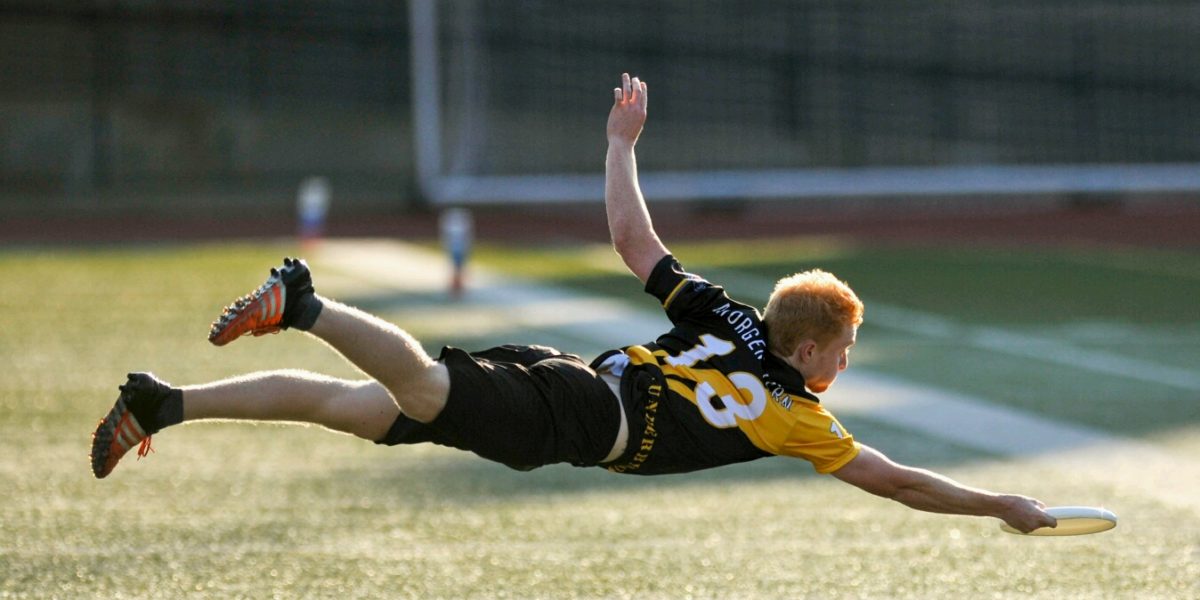 Carl Morgenstern lays out in a Thunderbirds game this past season (Photo: Ed Thompson)
Carl Morgenstern lays out in a Thunderbirds game this past season (Photo: Ed Thompson)
Earlier this summer, I was struck by a Martin Luther King Jr. quote that Markham Shofner posted on twitter. To summarize the message: If you want to see change, you cannot wait for a better time; change only happens when you make it happen.
It is time for men’s players to speak up. The gender imbalance in sports in our society is a much bigger issue than just ultimate.
Playing sports—especially ultimate—has greatly enhanced my life. Ultimate gives me a sense of pride and purpose; I’m able to express passion and release stress on an almost daily basis. I would argue that I am a much healthier, happier, and more confident person because of sports. Ideally, these benefits should be available to everyone. However, as a male, I was given a leg up in sports: not only did I have every opportunity to play sports as a kid, I had publicly revered male idols to look up to.
In my second year of little league, I was on the “Red Sox”, had long messy hair, and played center field. Johnny Damon had long, slightly less messy hair, played center field, and was a rising star on the real Red Sox, so he became my idol. Johnny Damon’s Red Sox won the World Series for the first time in 86 years (breaking Babe Ruth’s curse) the same year my team won our little league championship. I was an undersized, underdog kid, but if my hero could accomplish the impossible, so could I.
Damon’s success gave me the hope that I could play pro sports someday. So I worked hard to be the best athlete I could be, and in a fortunate turn of events I was led to play ultimate my senior year of high school. Now, as a member of the Pittsburgh Thunderbirds and the USA U24 Open team, I have proven to myself that I can accomplish my goals. Though my teams are not quite as popular as the Red Sox, I believe I can inspire kids, and as a “pro” athlete I’m occasionally afforded the opportunity to do so.
Following a Thunderbirds home game, the announcer named me the “Player of the Game”. My mom — who had been excitedly dancing in the stands the entire game — approached me alongside a little girl, no older than five. She was wide-eyed and seemed starstruck. As cool as that moment was for her, I couldn’t help but imagine the impact a female role model would have had in my place.
A female player could have been to the girl what Damon had been to me. However, the lack of playing opportunities for women in the AUDL not only prevents this, but also supports the notion that the best athletes can only be men.
This is why pro ultimate needs to be mixed, now. We cannot wait for a male league to succeed before a mixed or women’s league is formed. (Almost) all the role models in the AUDL are male, strengthening the message that women are not as valued in sports as men. A mixed league, showcasing hundreds of elite female athletes competing on the same field as men, could begin to change this oppressive narrative.
I used to think that mixed gender play at the professional level would not be feasible, but I have changed my mind. The mixed version of the sport is played at an elite level across the country, has been on ESPN, and is played at the highest level because of the World Games. If you include pickup and seasonal leagues, the majority of ultimate is played mixed. On top of these reasons, pro teams would have twice the athletes to choose from during tryouts. If there were no pro single-gender leagues to compete with, just like the World Games, the talent across the board should rise.
The AUDL’s goal is to break into the mainstream sports fan base (mostly men), but ultimate is a niche sport, so maybe we should try to attract new sports fans: females. There are almost unlimited options for fans to consume sports, so why watch ultimate? A sport whose highest level includes men and women on the same field might be more likely to create a fan or recruit out of women/girls who would not normally watch sports.
Though I cannot force the AUDL to transition to a mixed league, I would still like to support women’s ultimate. I will be donating my past season’s Thunderbirds salary to support women’s U24 athletes in their travels to Perth, and I ask that other AUDL athletes do the same to support women in their community. It is not right that men can play for pay when women do not even have the chance to play for free.
Ultimate is changing. Whatever happens in the next couple years could determine the future of our sport for decades. Let’s set our sport up to positively impact the world we live in, rather than strengthening prejudices. Maybe, eventually, more women will play ultimate than men. That should be the goal. That would be equity in ultimate.








Comments Policy: At Skyd, we value all legitimate contributions to the discussion of ultimate. However, please ensure your input is respectful. Hateful, slanderous, or disrespectful comments will be deleted. For grammatical, factual, and typographic errors, instead of leaving a comment, please e-mail our editors directly at editors [at] skydmagazine.com.